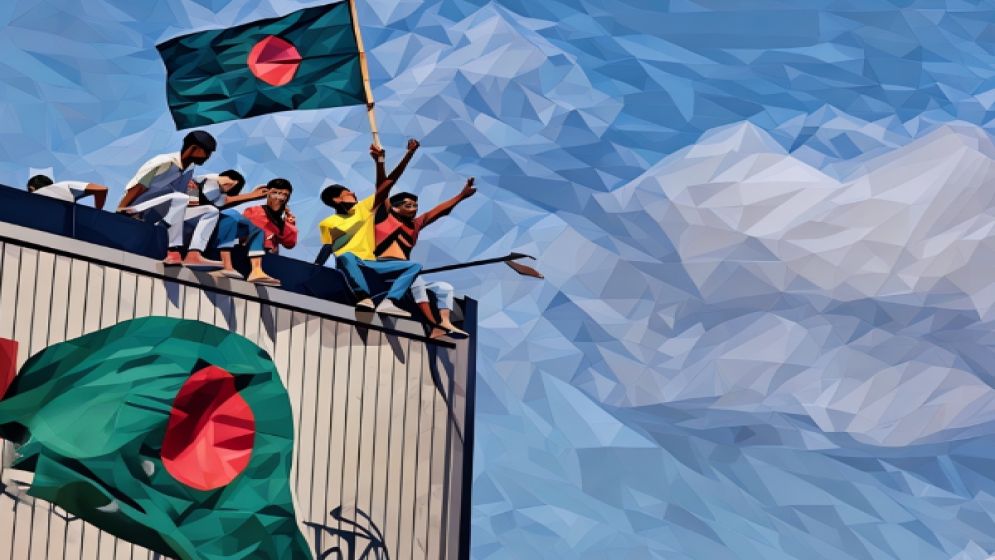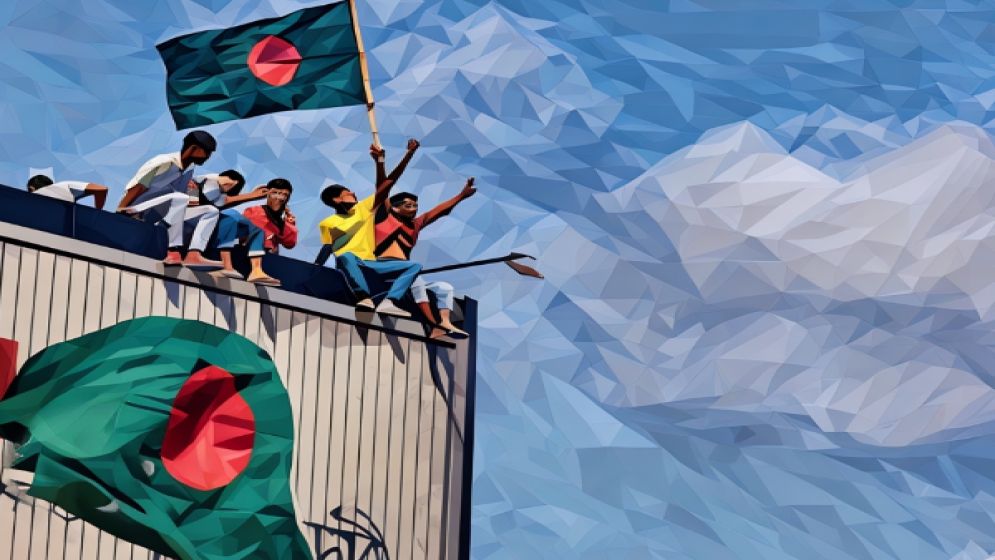
Abu Taib Ahmed
In 2024, Bangladesh finds itself facing perhaps the most significant moment in its modern history.
After decades of suffocating authoritarian rule, the country has finally shaken off its longest and most brutal tyranny.
A student-led uprising—a massive, powerful demonstration of the people’s will—has brought down the iron-fisted dictator, Sheikh Hasina.
Her name, once synonymous with power, is now firmly linked with authoritarianism, oppression, and violence. In the public consciousness, Hasina will be remembered not just as a ruler, but as a symbol of everything that was wrong with the country’s political machinery.
Hasina’s dictatorship was characterized by its profound cruelty, making her, in recent global memory, one of the rare figures to actively appeal for foreign military intervention to cling to power.
In an act that exposed her desperation, she was willing to sacrifice thousands of her own people—her own countrymen—to maintain her stranglehold. Indeed, there was no threshold she was unwilling to cross.
As the nation moves into 2024, this is undeniably something to celebrate—the fall of a regime that sought to crush the spirit of democracy.
Yet, even amidst the sense of relief and triumph, there is a palpable, undeniable sorrow. Hasina’s departure, while momentous, came at a devastating cost.
Nearly 2,000 lives were lost in the final violent throes of her regime—a bloodbath carried out by her own security forces. These were not faceless victims. These were brothers, sisters, and children—lives taken too soon, lives marked by the indelible stain of tyranny.
And so, even as the nation looks forward to a new dawn, there is an unspoken question that weighs heavily on the collective conscience: Can we truly celebrate the fall of this tyrant without reckoning with the blood on her hands?
How can we honor the victory over Hasina’s regime while we still feel the anguish of those who have been lost? How can we move forward without confronting the brutality that stained every corner of Bangladesh during her reign?
Mass killings trial: A nation’s quest for justice
The people of Bangladesh remain in the dark about the interim government’s actual plans regarding the prosecution of those responsible for the mass killings, with only sporadic comments from a few advisers offering limited reassurance.
By now, the government should have unveiled a clear, concrete roadmap detailing the steps taken so far and the future course of action. However, it seems there is no substantial momentum behind holding those accountable for the killings.
What the interim administration should have done is establish a new tribunal dedicated exclusively to prosecuting the masterminds and enablers of the mass killings.
Instead, unfortunately, the government appears to be relying on the controversial ICT (International Crimes Tribunal)—which is already associated with one of the darkest chapters in Bangladesh’s judicial history—to try those responsible for the violence of July-August 2024.
This approach seems to mirror a “tit-for-tat” policy rather than signaling any genuine transformation in the country’s political culture, especially from a group that has been vocal about the need for political reform.
The trial of Bangladesh Awami League (BAL) leadership and their enablers is crucial, not only for delivering justice, but also for achieving some measure of reconciliation in a society deeply fractured by the legacy of 1971. Without justice, true reconciliation remains impossible.
Moreover, the mass killings are not only a domestic issue—they are deeply intertwined with the country’s sovereignty and national security.
There is credible evidence suggesting that foreign armed forces, possibly from a neighboring country, may have been involved in the killings, as several witnesses have testified.
Therefore, holding a proper trial would not only serve justice but also potentially expose foreign military involvement, shedding light on a deeply troubling chapter in the country’s recent history.
Reform or Ruin: The way forward?
Rashtra Sangskar, or “State Reform,” has become a central term in the political discourse in Bangladesh, particularly leading up to the mass upsurge of August 5.
The interim government often cites this notion of reform as one of the main justifications for its continued rule. In response, the government has established a number of commissions aimed at implementing reforms across various sectors.
However, the actions taken so far suggest a fundamental misunderstanding of what true reform entails, or perhaps a lack of clarity about where and how reforms should be implemented.
Reform is a complex, gradual process that cannot be achieved overnight, especially when dealing with human society, which is inherently multifaceted. It takes time—decades, perhaps—to bring about meaningful change.
A society is not a machine that can be fixed simply by pressing a reset button.
Reform consists of two intertwined elements: the cultural and the structural. While structural changes are necessary, the cultural component—the very heart of the problem—is far more challenging to address.
The political system’s core issue is rooted in the “political expediency” of political forces and their leadership. All political parties, whether knowingly or unknowingly, resort to political expediency, often putting short-term gains ahead of long-term, sustainable solutions.
A major flaw in our political culture is the tendency of political parties to prioritize their own interests above the public’s. The primary audience for their actions is not the people of the country but the party itself.
In this system, it’s less important whether a politician is right-wing or left-wing; what truly matters is their financial and intellectual integrity. This has created a political environment where public trust is continually eroded.
Furthermore, Bangladesh’s political culture is also shaped by a deeply polarized society, which has existed since the country’s creation in 1971.
The so-called “spirit of the liberation war” has often been weaponized for political gain, used to persecute opposition and marginalize those who stand in the way of the ruling party’s vision for the nation.
For true democracy to flourish, it is vital to create a public sphere that allows for diverse political views, where people from all sides of the spectrum can coexist and engage in open discourse.
If we are to honor the sacrifices of the 2024 martyrs and truly embrace democratic ideals, we need more than just honest politics.
We need honest individuals—those with strong financial and intellectual integrity—who will create the space for genuine political discourse. This is not just about individuals but about democratizing the public sphere, ensuring equal space for all voices, regardless of their political affiliations.
Decentralizing Power: A Crucial Step for Reforms
While changing the cultural aspects of our politics may take time, there are structural reforms that can be implemented now to begin the transformation.
One of the key challenges is Bangladesh’s “winner-takes-all” political culture, which is a product of its centralized governing system, where all executive power is concentrated in the hands of a single individual.
This centralization undermines the principles of democracy, as it limits checks and balances, fostering an environment where power can be wielded without adequate oversight.
Reforms that decentralize power, create stronger institutions, and ensure greater accountability could help shift this culture over time, eventually leading to a more balanced and democratic system.
So, the first and most crucial structural change that Bangladesh must implement is the decentralization of state power.
This can be achieved by creating more independent, elected public bodies—such as an independent, elected Supreme Judicial Council, an Independent Elected Public Media Commission, and an Independent Elected Election Commission.
Such measures would create a more balanced and accountable system of governance, reducing the concentration of power in any single institution.
Bangladesh could also consider adopting a governance model similar to the United States’ House of Representatives and Senate system, which would provide a better balance and more effective checks and balances in the decision-making process.
In addition to decentralizing power, the incumbent government should have established a single national commission to conduct comprehensive deliberations on what reforms are necessary, rather than setting up six separate commissions.
The fragmented approach taken by the government is likely to lead to conflicting recommendations in certain areas, which could hinder the reform process. A unified commission could ensure a more coherent, focused, and coordinated strategy for addressing the country’s pressing issues.
Building consensus on truth and justice
While reforming the political system is crucial, Bangladesh must also foster a national consensus—one that is based on truth and justice.
Achieving consensus on these foundational principles is more feasible than agreeing on the state’s ideology or transcendental truths, which often divide people.
Unity on the importance of truth and justice can form the basis for rebuilding trust in the country’s political and legal institutions.
At present, the future of the country seems uncertain. There has been little meaningful effort to bring the perpetrators of the mass killings, including former Prime Minister Sheikh Hasina, to justice.
The mass uprising’s advocates are pushing for change, but their efforts so far appear fragmented and lacking the significant, long-term reforms necessary to alter the country’s entrenched political culture.
Without addressing these fundamental issues, it is unlikely that Bangladesh will move toward a truly democratic and just future.
There is also a palpable sense of fear among the people that the Bangladesh Awami League (BAL), or at least some of its affiliated socio-cultural groups, will make a strong comeback shortly after the general elections.
This could happen under the banner of “the spirit of ’71,” a deeply ingrained political symbol in the country. While the desire to maintain national unity is important, the return of BAL in any form would risk exacerbating the political division and perpetuating the cycle of corruption and centralization that has plagued the country.
Despite this looming uncertainty, there is no other viable option for Bangladesh than to transfer power back into the hands of the people’s representatives as quickly as possible.
Failure to do so risks precipitating a governance failure that could further destabilize the country and diminish any remaining trust in its political system.
In conclusion, while decentralizing power and forging a consensus on truth and justice are essential for meaningful reform, Bangladesh must urgently tackle the challenges posed by the return of old political forces and the persistent risks of governance failure.
The future of the nation hinges on the ability to build a political culture that is both democratic and genuinely inclusive. Only then can Bangladesh hope to move forward from its troubled past and create a system that serves the people, rather than the political elites.
—-
Abu Taib Ahmed is a PhD candidate and instructor of record at Colorado State University
bangla outlook

